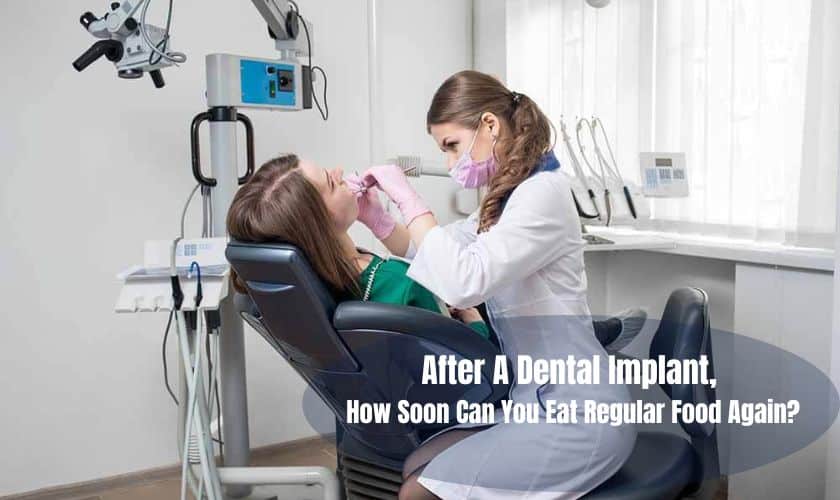A dental implant is a suitable option where a lack of natural teeth roots do not allow building denture or other tooth replacements. If you’ve recently had dental implant surgery, you’re probably anxious to get back to eating regular food. After all, it can be challenging to switch from a soft diet to a more solid one. But before you reach for that steak or crunchy apple, it is essential to understand when and how you should transition back to your regular diet. This article will discuss aftercare tips for dental implant surgery, what foods are safe to eat after a dental implant, and when to start eating normally again.
How Soon After Dental Implant Can I Eat Normally?
Dental implants are an excellent solution for replacing missing teeth. Still, many people wonder how long after dental implant surgery it will take for them to be able to enjoy their favorite foods again. While dental implant recovery times vary from patient to patient, in most cases, you can expect to be able to eat normally within three days of your dental implant procedure. Generally speaking, it takes about a week for patients to return to their regular eating habits after dental implant surgery. However, if you’re a fast healer, you can return to solid food within 24-48 hours post-surgery. Most dentists recommend refraining from having hard foods as they might induce bleeding, which delays the estimated healing time. It is essential to listen to your dentist or oral surgeon’s advice and instructions regarding what kinds of food and drinks you should avoid during the dental implant recovery process. Following these instructions will help ensure a smooth dental implant recovery so you can enjoy all your favorite dishes again soon!
Meals To Eat After Dental Implant Surgery
Liquid Diet During The Recovery Time
After dental implants are placed, following your dentist’s instructions on what foods are safe for you to eat during the recovery period is essential. Typically, it is recommended that patients stick with a liquid diet in the first few days following their procedure. This includes things like broth-based soups and smoothies made with yogurt or milk. Avoiding hard foods during this time will help reduce the risk of damaging the surgical site before it fully recovers.
Cooked Cereals
Once the implant site has settled, many dentists recommend introducing cooked cereals into your diet, such as oatmeal or Cream of Wheat. These soft grains are easy on the teeth and gums and provide valuable nutrients like iron and B vitamins which promote healing. Be sure to avoid any cereals that contain nuts or seeds, as these could damage the implant site if eaten too soon after surgery.
Avoid Sugary Or Acidic Food
Sugary snacks such as candy bars and cakes should be avoided after dental implant surgery. It’s because they can increase inflammation at the surgical site, which can delay healing time. Additionally, acidic foods like tomatoes or citrus fruits should be avoided as they can irritate the gums and cause discomfort around the implant site. Stick with softer items such as mashed potatoes or steamed vegetables until your mouth has healed completely.
Leafy Green Vegetables
Leafy green vegetables such as spinach and kale are great for promoting healing after dental implants because they are full of antioxidants that reduce inflammation in the body. These vegetables also contain loads of essential vitamins and minerals, which help keep your immune system strong during recovery. Make sure to incorporate them into your meals whenever possible!
Avoid Hard Foods
While some hard foods may not necessarily damage an implant site if chewed properly, it is generally recommended that patients avoid them until their mouths have fully healed up. Harder items include steak or apples, so hold off on those until you get clearance from your dentist!
Dental Implant Surgery Aftercare Tips
After dental implant surgery, proper aftercare is essential for a successful recovery. With the appropriate aftercare practices, dental implants can succeed and create additional issues for your mouth that could have been avoided with extra care. While dental implant aftercare may vary due to the type of dental implant procedure and the patient’s needs. However, some consistent tips are to practice good dental hygiene, minimize physical activity, and avoid smoking. Additionally, some over-the-counter pain medications might be necessary if the dental implant site starts to hurt. It’s also essential to make periodic follow-up appointments with your dentist following dental implant surgery to monitor and check the healing process. Following these simple dental implant aftercare tips will help ensure that your new dental implants remain healthy and serve you well for years to come.
The Bottom Line
Dental health is something everyone needs to pay attention to; making sure that our teeth stay healthy allows us to continue enjoying our favorite foods without any issues! Following your dentist’s instructions is vital after having any dental work done. It helps to ensure proper healing times and prevent any further complications from occurring down the line. For those who recently had a dental implant, sticking with softer items during recovery time is vital – especially sugary or acidic since these can aggravate existing inflammation at the surgical sites! Eating leafy green vegetables helps promote healing while avoiding harder items ensures no additional damage is done, so take care when transitioning back to your normal diet post-surgery!
FAQs
Don’t eat hard food immediately after getting a dental implant. It will affect your recovery time primarily.
It takes over a week to recover from the dental implant surgery.

